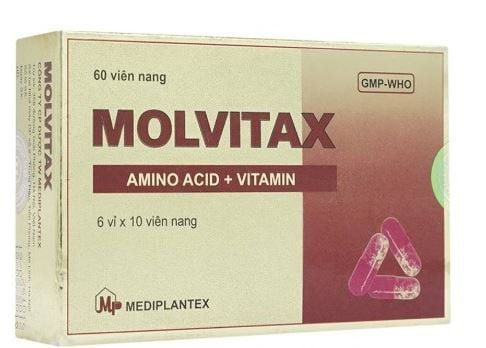This is an automatically translated article.
Whole grains have been part of the human diet for tens of thousands of years. In addition to providing food, eating whole grains offers various benefits, including a reduced risk of diabetes, cardiovascular disease, and high blood pressure. Here are the top 9 health benefits of eating whole grains.1. Rich in nutrients and fiber
Whole grains provide many important nutrients, including:Fiber. Most of the fiber in whole grains is concentrated in the bran. Vitamin. Whole grains are especially rich in B vitamins, including Niacin, Folate, and Thiamine. Mineral. The content of minerals such as zinc, iron, magnesium and manganese in whole grains is abundant. Protein. Whole grains have up to several grams of protein per serving. Antioxidants. Whole grains contain many compounds that act as antioxidants such as phytic acids, lignans, ferulic acids, and sulfur compounds. Plant compounds. Whole grains contain a variety of disease-preventing plant compounds such as polyphenols, stanols, and sterols. The exact amount of these nutrients depends on the type of grain. However, for a specific example to help you understand, here is the nutritional content of 28 grams of dry oats:
Fiber: 3 grams of Manganese: 69% of the Reference Daily Intake (RDI) Phosphorus : 15% RDI Thiamine: 14% RDI Magnesium: 12% RDI Copper: 9% RDI Zinc and iron: 7% RDI
Trắc nghiệm: Muối trong thực phẩm, natri, huyết áp và sức khỏe của bạn
Muối, natri là chất khoáng cần thiết cho cơ thể để duy trì hoạt động ổn định. Tuy nhiên, chế độ ăn thừa muối có nguy cơ cao dẫn tới các vấn đề sức khỏe nghiêm trọng. Cùng làm bài trắc nghiệm sau đây để hiểu hơn về những ảnh hưởng của các khoáng chất này tới huyết áp và sức khỏe bạn thế nào nhé.
Nguồn tham khảo: webmd.com
2. Reduce the risk of heart disease
One of the biggest benefits of eating whole grains is that they help reduce the risk of cardiovascular disease, which is the leading cause of death worldwide. Conclusions from 10 studies show that eating three servings (28 grams each) of whole grains per day can reduce the risk of cardiovascular disease by 22%.Similarly, a 10-year study of more than 17,000 adults found that those who ate high amounts of whole grains had a 47 percent lower risk of heart disease than the rest. The researchers concluded that to take care of heart health, people should increase their intake of more whole grains and less refined grains.
MORE: Difference between whole grains and refined grains and regular grains

3. Reduce the risk of stroke
In a study with 250,000 participants, eating whole grains was found to reduce the risk of stroke by more than 14% compared to eating regular foods. In addition, certain compounds found in whole grains, such as vitamin K, fiber, and antioxidants, have been shown to reduce the risk of stroke. That's why whole grains are often recommended in the DASH diet to promote heart health and reduce stroke risk.4. Reduce the risk of obesity
High-fiber foods often keep you full for a long time and limit the intake of too many calories. Many studies also show that whole grains and related products are more filling than refined grains and reduce the risk of obesity. This is why experts often recommend including a high-fiber diet in a weight loss plan. In fact, if you diligently eat 3 servings of whole grains a day, you can reduce both your body mass index (BMI) and belly fat.5. Reduces the risk of type 2 diabetes
A joint conclusion drawn from 16 studies has shown that replacing refined grains with whole grains and eating at least 2 servings of whole grains per day can reduce the risk of type 2 diabetes. . Part of that is because fiber-rich whole grains help control weight and prevent obesity, which is a major contributor to diabetes.Furthermore, nutritionists have linked eating whole grains with reduced fasting blood sugar and improved insulin sensitivity. This may be due to magnesium, a mineral found in whole grains that helps the body metabolize carbs and impacts insulin sensitivity.
MORE: 24 foods to help you control diabetes
6. Strengthen the digestive system
The fiber in whole grains can help keep the digestive system healthy in a variety of ways. First, fiber helps increase stool weight and reduces the risk of constipation. Second, certain types of fiber in whole grains act as prebiotics, providing beneficial bacteria for the gut and making the digestive system work more efficiently.
7. Reduce inflammation
Inflammation is the root cause of many chronic diseases. Some evidence suggests that whole grains can help reduce inflammation, and that people who eat more whole grains are less likely to die from chronic diseases related to inflammation.Another study asked participants to replace refined wheat products with whole wheat products and found a marked reduction in inflammatory markers. The results of these studies encourage patients with chronic conditions to prioritize eating whole grains over refined grains.
8. Reduces Cancer Risk
Among the many studies that show, whole grains have the strongest benefit against colorectal cancer, which is one of the most common types of cancer. In addition, the fiber found in whole grains acts as a prebiotic to help reduce the risk of cancer. Other ingredients such as phytic acid, phenolic acid and saponins have been shown to slow down the growth of cancer.9. Reduced risk of dying from chronic disease
As rates of chronic diseases decrease, so does the risk of premature death from these conditions. One fact study found that eating whole grains can significantly reduce your risk of dying from heart disease. This is even more valid if the patient is combined with other lifestyle adjustments such as stopping smoking, limiting alcohol, stabilizing weight and keeping an overall balanced and reasonable diet. It is estimated that consuming each serving (28 grams) of whole grains reduces the risk of dying from chronic disease by 5%.To improve health and longevity, consider adding whole grains to your daily diet. Combining a variety of good grains, such as oatmeal, brown rice, quinoa..., will be one of the best decisions for your health.
Please dial HOTLINE for more information or register for an appointment HERE. Download MyVinmec app to make appointments faster and to manage your bookings easily.
Reference source: healthline.com












